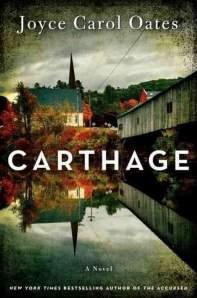*****
Fourth Estate, 2014
ASIN B00DJHKGUK
Part of the Mysterious USA Mystery reading challenge

The story about a girl’s disappearance in the tight-knit New York state town of Carthage leads the reader down unexpected paths where the question is no longer what happened to Cressida, but how and why do life-changing moments happen and how different people react to them.
Cressida is the 19-year-old daughter of former mayor and local, lovable big shot, Zeno Mayfield. After Cressida vanishes unexpectedly, evidence grows that her sister’s former fiancé, an injured war veteran, was involved in her disappearance.
Like most of Joyce Carol Oates’ work, Carthage left me with more questions than I had at the beginning, but I did not feel unsatisfied when I put the book down. On the contrary, I was left with a lot to think about.
This is exactly what I love about of Oates’ work: at the beginning, I want to know who did it, what happened, what is going to happen—I am all wrapped up in the story; at the end, these questions may or may not be solved, but I am left with deeper questions about how this country treats its veterans, its mentally ill, and its prisoners. Carthage also left me with even more profound questions regarding guilt, redemption, femininity, honesty, the meaning of home and family.
Oates’ use of language is masterful, as is the dialog and description. Reading this book I realized that I generally don’t fall in love with Oates’ characters; in fact, I usually dislike most of them as people but adore how complex and well-constructed they are. Some characters I do like, like Zeno; most I dislike, but they all evoke a strong personal response. For example, I absolutely hated Cressida—but I understood her and recognized one or two Cressidas in my life.
In all their complexity, however, the characters are also archetypical and representative of current central positions and issues in society: the injured soldier, the death row inmate, the liberal politician, the cancer survivor, the battered woman…
I am also glad I picked this book to represent New York in the Mysterious USA Mystery reading challenge. I went to college in NYC, but never got to see much else of the state, so I was glad this book dealt more with life in small-town New York and not the big city.
Carthage is a real town in upstate New York, near Lake Ontario. Through her account, Oates describes the social, economic, and class distinctions in a place where everyone knows everyone else. Bret’s mother was an especially interesting character, in this sense. I loved to hate her!
I cannot say enough good things about this novel. I liked it so much that it kicked off a JCO binge—I just finished The Garden of Earthly Delights, I believe her second novel, and I absolutely loved it too.
Go back to Mysterious USA Reading Challenge
Go Back to Book Reviews
